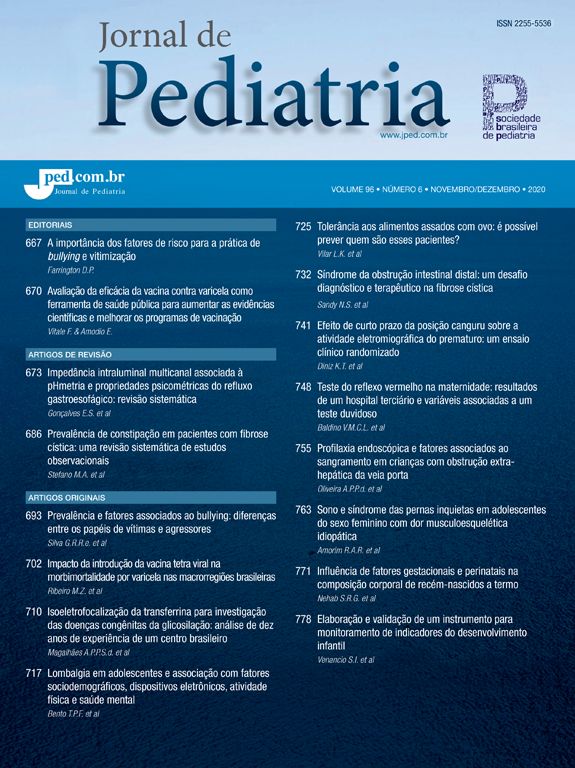To determine whether the administration of cyproheptadine was able to induce weight gain in patients with cystic fibrosis.
MethodsWe performed a double-blind, placebo-controlled trial in two centers in Brazil. Twenty-five patients with cystic fibrosis between 5 and 18 years completed the study. Patients were randomized into two groups, to receive either cyproheptadine 4 mg three times per day for 12 weeks or placebo. All data were collected at the beginning and at the end of the study period and included weight, height and spirometry.
ResultsAverage weight gain was 0.67 kg in the placebo group and 1.61 kg in the cyproheptadine group (p = 0.036). Body mass index (BMI) decreased 0.07 kg/m² in the placebo group and increased 0.46 kg/m² in the intervention group (p = 0,027). The change in BMI for age (z score) was -0.19 in the placebo group and +0.20 in the cyproheptadine group (p = 0.003). BMI z score decreased 0.19 in the placebo group and increased 0.2 in the cyproheptadine group (p = 0.003). Changes in pulmonary function were not statistically different.
ConclusionUse of cyproheptadine in cystic fibrosis patients was well tolerated, showing a significant weight gain and a significant increase in BMI after 12 weeks. A clinically relevant effect size for weight/age (z score) and body mass index for age (z score) was found. Such findings suggest that the prescription of cyproheptadine can be an alternative approach for patients who need nutritional support for a short period of time.
O objetivo deste estudo foi determinar se a administração de ciproheptadina é capaz de induzir ganho de peso em pacientes com fibrose cística.
MétodosFoi realizado um estudo duplo-cego, controlado com placebo em dois centros no Brasil. Vinte e cinco pacientes com fibrose cística entre 5 e 18 anos completaram o estudo. Os pacientes foram randomizados em dois grupos, para receber ciproheptadina 4 mg três vezes por dia durante 12 semanas ou placebo. Todos os dados foram coletados no início e no final do período de estudo e incluíram peso, altura e espirometria.
ResultadosO ganho de peso médio foi de 0,67 kg e 1,61 kg nos grupos placebo e ciproheptadina, respectivamente (p = 0,036). O índice de massa corporal (IMC) diminuiu 0,07 kg/m² no grupo placebo e aumentou 0,46 kg/m² no grupo intervenção (p = 0,027). A mudança no IMC para a idade (escore z) foi de -0,19 no grupo placebo e 0,20 no grupo ciproheptadina (p = 0,003). O IMC escore z diminuiu 0,19 no grupo placebo e aumentou 0,2 no grupo ciproheptadina (p = 0,003). Alterações na função pulmonar não foram estatisticamente diferentes.
ConclusãoO uso de ciproheptadina em pacientes com fibrose cística foi bem tolerado, apresentando um ganho de peso significativo e um aumento no IMC após 12 semanas. Foi encontrado um tamanho de efeito clinicamente relevante para o peso/idade (escore z) e IMC para idade (escore z). Tais achados sugerem que a prescrição de ciproheptadina pode ser uma abordagem alternativa para pacientes que precisam de suporte nutricional por um curto período de tempo.









